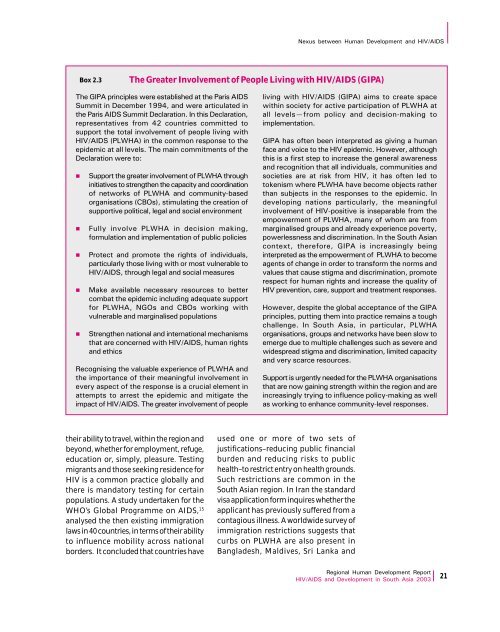Download Report - UNDP Asia-Pacific Regional Centre - United ...
Download Report - UNDP Asia-Pacific Regional Centre - United ...
Download Report - UNDP Asia-Pacific Regional Centre - United ...
Create successful ePaper yourself
Turn your PDF publications into a flip-book with our unique Google optimized e-Paper software.
Nexus between Human Development and HIV/AIDSBox 2.3The Greater Involvement of People Living with HIV/AIDS (GIPA)The GIPA principles were established at the Paris AIDSSummit in December 1994, and were articulated inthe Paris AIDS Summit Declaration. In this Declaration,representatives from 42 countries committed tosupport the total involvement of people living withHIV/AIDS (PLWHA) in the common response to theepidemic at all levels. The main commitments of theDeclaration were to:nnnnnSupport the greater involvement of PLWHA throughinitiatives to strengthen the capacity and coordinationof networks of PLWHA and community-basedorganisations (CBOs), stimulating the creation ofsupportive political, legal and social environmentully involve PLWHA in decision making,formulation and implementation of public policiesProtect and promote the rights of individuals,particularly those living with or most vulnerable toHIV/AIDS, through legal and social measuresMake available necessary resources to bettercombat the epidemic including adequate supportfor PLWHA, NGOs and CBOs working withvulnerable and marginalised populationsStrengthen national and international mechanismsthat are concerned with HIV/AIDS, human rightsand ethicsRecognising the valuable experience of PLWHA andthe importance of their meaningful involvement inevery aspect of the response is a crucial element inattempts to arrest the epidemic and mitigate theimpact of HIV/AIDS. The greater involvement of peopleliving with HIV/AIDS (GIPA) aims to create spacewithin society for active participation of PLWHA atall levels—from policy and decision-making toimplementation.GIPA has often been interpreted as giving a humanface and voice to the HIV epidemic. However, althoughthis is a first step to increase the general awarenessand recognition that all individuals, communities andsocieties are at risk from HIV, it has often led totokenism where PLWHA have become objects ratherthan subjects in the responses to the epidemic. Indeveloping nations particularly, the meaningfulinvolvement of HIV-positive is inseparable from theempowerment of PLWHA, many of whom are frommarginalised groups and already experience poverty,powerlessness and discrimination. In the South <strong>Asia</strong>ncontext, therefore, GIPA is increasingly beinginterpreted as the empowerment of PLWHA to becomeagents of change in order to transform the norms andvalues that cause stigma and discrimination, promoterespect for human rights and increase the quality ofHIV prevention, care, support and treatment responses.However, despite the global acceptance of the GIPAprinciples, putting them into practice remains a toughchallenge. In South <strong>Asia</strong>, in particular, PLWHAorganisations, groups and networks have been slow toemerge due to multiple challenges such as severe andwidespread stigma and discrimination, limited capacityand very scarce resources.Support is urgently needed for the PLWHA organisationsthat are now gaining strength within the region and areincreasingly trying to influence policy-making as wellas working to enhance community-level responses.their ability to travel, within the region andbeyond, whether for employment, refuge,education or, simply, pleasure. Testingmigrants and those seeking residence forHIV is a common practice globally andthere is mandatory testing for certainpopulations. A study undertaken for theWHO’s Global Programme on AIDS, 15analysed the then existing immigrationlaws in 40 countries, in terms of their abilityto influence mobility across nationalborders. It concluded that countries haveused one or more of two sets ofjustifications–reducing public financialburden and reducing risks to publichealth–to restrict entry on health grounds.Such restrictions are common in theSouth <strong>Asia</strong>n region. In Iran the standardvisa application form inquires whether theapplicant has previously suffered from acontagious illness. A worldwide survey ofimmigration restrictions suggests thatcurbs on PLWHA are also present inBangladesh, Maldives, Sri Lanka and<strong>Regional</strong> Human Development <strong>Report</strong>HIV/AIDS and Development in South <strong>Asia</strong> 2003 21
















